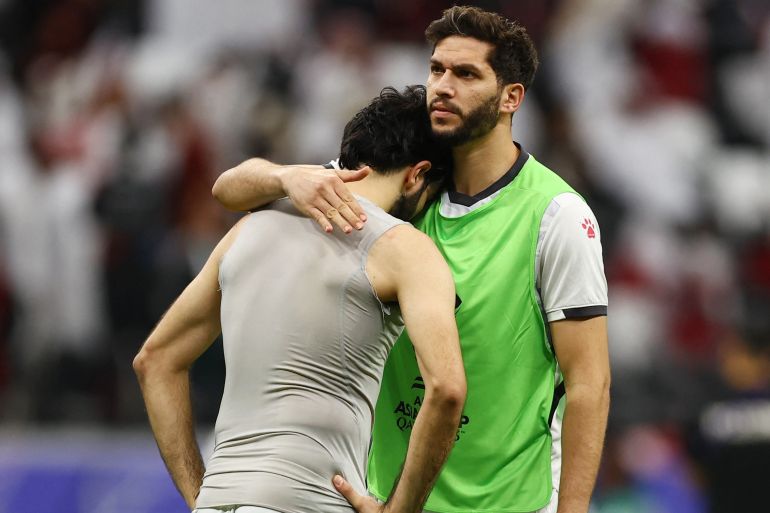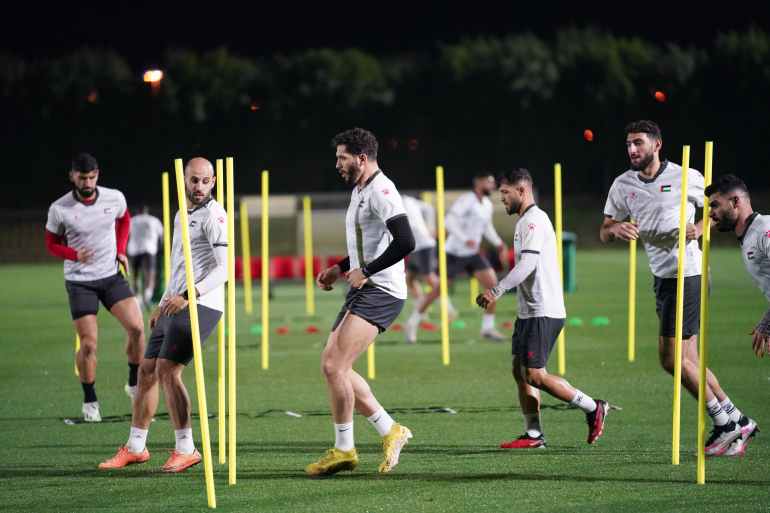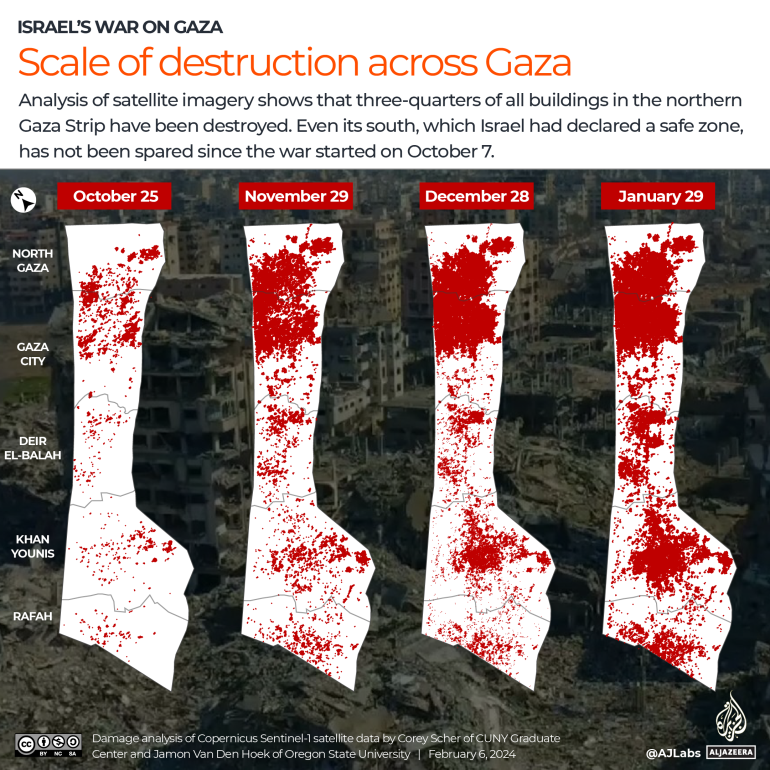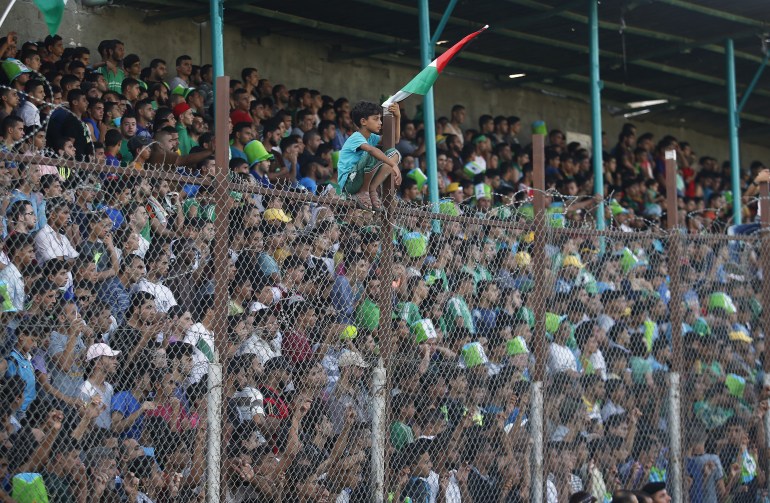‘In Gaza, football is the only escape’: Palestine star Mahmoud Wadi on war
Wadi talks to Al Jazeera about growing up in Gaza amid wars, leaving it to follow his dream and the struggles of being a Palestinian footballer amidst the ongoing war in Gaza.

On October 7, Palestinian footballer Mahmoud Wadi was recovering from an injury in Egypt when Israel launched its war on Gaza, following the Hamas attacks on southern Israel.
The 29-year-old, from Khan Younis in southern Gaza, has spent the past five months desperately seeking news about the safety of his friends and family in the besieged enclave while travelling with the Palestinian national team.
Keep reading
list of 4 items‘Many players have died’: Israel’s war on Gaza hits Palestinian football
The beautiful game: Still a crucible for protest in Hong Kong?
The Take: Palestinian joy at the AFC Asian Cup
He has lived through three Israeli military assaults on Gaza – in 2008, 2012 and 2014 – and says he remembers spending every night wondering if he would make it to dawn.
Wadi, who now lives in Cairo and plays for Arab Contractors in the Egyptian Premier League, was part of Palestine’s squad for the AFC Asian Cup 2023 in Qatar, where the team recorded a historic second-round finish.
The al-Fidayi (as the Palestinian team is known to its fans) received passionate support from the crowds of people from various countries, religions and age groups, who turned up in their tens of thousands to support the Palestinian team before their round-of-16 elimination by hosts and eventual champions Qatar.
In a conversation with Al Jazeera, Wadi opens up about the struggles of putting on his best performance on the field while the war rages at home.
Al Jazeera: Growing up in Gaza, what did football mean to you?
Wadi: Football is the only escape from war and the Israeli occupation. Young people and children turn to football as it offers distraction from the circumstances. Football makes them feel good. In Gaza, we love football. But the wars waged against us over the years, the harsh economic conditions and the siege that has completely closed Gaza and its people, preventing children from achieving their [footballing] dreams.
The Israeli occupation always places barriers and obstacles that prevent us from achieving that and, unfortunately, people leave Palestine. We are forced to look for options elsewhere.
Al Jazeera: Why did you leave Gaza and how difficult was that decision?
Wadi: To leave your country, your homeland, your family and your friends for a better future is not easy. It brings a constant feeling of alienation and loneliness. But we make sacrifices for our ambitions. We are people who love life, people who want to live like others and follow our dreams. The difficulty lies in the fact that you are leaving behind the people you love.
Now, I live abroad and my family is in Gaza exposed to the killing, destruction and displacement. I left Gaza, my family and friends to play football, but I live in fear and anxiety.
We do not leave Palestine because it is not a beautiful country. We love our land madly, but we have to search for a better life.
Al Jazeera: What are the struggles of being an international footballer for Palestine?
Wadi: In light of the Israeli occupation and its obstacles, it is not easy to be a footballer. It has a massive impact because you cannot gather players for football camps in Palestine.
Players from Gaza cannot enter the occupied West Bank, and vice versa. There are players outside Palestine who cannot enter, and so on. Despite the difficult circumstances, the Palestine national team gathers abroad from various places. We have players from the occupied West Bank, Gaza Strip, Palestine 48, from various Palestinian refugee camps in the occupied territories, and from the diaspora.
No team in the world can go through such conditions and participate in a prestigious regional championship [like we have]. This in itself is considered a great Palestinian achievement and source of pride.
We have always harboured dreams and ambitions but the occupation tries to crush our spirit. We rose from under the rubble of three wars in order to reach where we are now, and we hope to carry on this path. We derive our strength from our people’s courage and steadfastness.

Al Jazeera: How difficult is it for you to communicate with friends and family back home?
Wadi: It is very difficult, especially when communication is cut off in Gaza. I have never left my phone since the start of the war. Be it in Egypt, while travelling with the team, or during our training sessions.
One morning, my brother disappeared. No one in my family knew anything due to a communication blackout. I felt very anxious during those 10 hours until I heard from him.
This is our situation: A constant feeling of anxiety and unimaginable conditions. It’s indescribable not knowing where your loved ones are, feeling helpless and unable to do anything. All you can do is pray. Every second of our lives is a test.
Al Jazeera: How do you feel after speaking to your family and friends in Gaza?
Wadi: They try to describe a small part of the reality they live through every day but it’s very difficult for them to convey their feelings. Words cannot describe the reality of the war. Our conversations are focused on the harsh and bitter conditions they face. But just like everyone else in Gaza, they remain brave.
Al Jazeera: What was it like to meet your family after two months?
Wadi: I met my mother, brothers, and their families in Egypt after more than 80 days of war. I had an image in my mind about the ugliness of the war, but when I looked at their weak faces, eyes, frail bodies, and white hair, it was far worse than anything I could imagine.
I have lived through three wars. It was scary spending nights waiting for bombs to drop and for the roof to crush me – but this war is not the same.
Al Jazeera: What is the last memory of Gaza in your mind?
Wadi: I remember the people, their affection, and their bonds of love. It feels great.
My last memory of Gaza was its sea, streets, buildings, and the electricity schedule – on for eight hours and off for the next eight.
Despite everything, Gaza was developing every day. Clean streets, beautiful facilities, restaurants, chalets on the sea – that’s the image of Gaza imprinted in my memory.
It deserved preservation of its sweetness and beauty. Despite the war, death and destruction, it is still beautiful and it will be more beautiful.
Just as we built it before, we will build it a second time, a third time and so on.
Al Jazeera: If you were able to go back to Gaza now, what would you do?
Wadi: I want to return to Gaza after the war ends and offer my condolences to the family of my best friend Hamed, who was martyred in this war. I want to see my brothers and their children, my friends, and I want to see Gaza and what happened to it after all this destruction.
I want to share with people a bit of their sorrow and memories of the war. I want to be a part of their suffering.

Al Jazeera: How did you feel when you saw the horrific video of Yarmouk Stadium being destroyed by Israeli forces?
Wadi: Yarmouk Stadium is not the only destroyed facility. There are thousands of mosques, churches, offices, hospitals, universities, and schools. Not even a tree or a stone has been spared.
I scored many goals in Yarmouk Stadium as hundreds of fans cheered. The image of the tank circling the stadium remains fresh in my memory. There are no words to describe its ugliness. But no matter how horrific these scenes are, they aren’t as horrific as the death of children and the images of them being blown into pieces that we see every day.
I can’t forget them for a single moment. They live within me.

Al Jazeera: When you step on the football pitch, are you able to take your mind off the war in Gaza?
Wadi: The war affects my family, my friends, and my people.
My cousin was martyred. My best friend was martyred. My childhood memories were destroyed. The occupation has destroyed all lives in Gaza.
Even if someone survives this war, they won’t be able to live a normal life. There are no job opportunities, no education, no offices or markets in Gaza. They killed all life there. We cannot forget the suffering, but it can motivate us.
The ferocity can be seen in the [Palestinian] team on the pitch. It reflects the character of the Palestinian people. As players, we motivate ourselves to make people happy, even if it is for a single moment.
We derive our strength from the suffering and steadfastness of our people.
The interview has been edited for length and clarity.